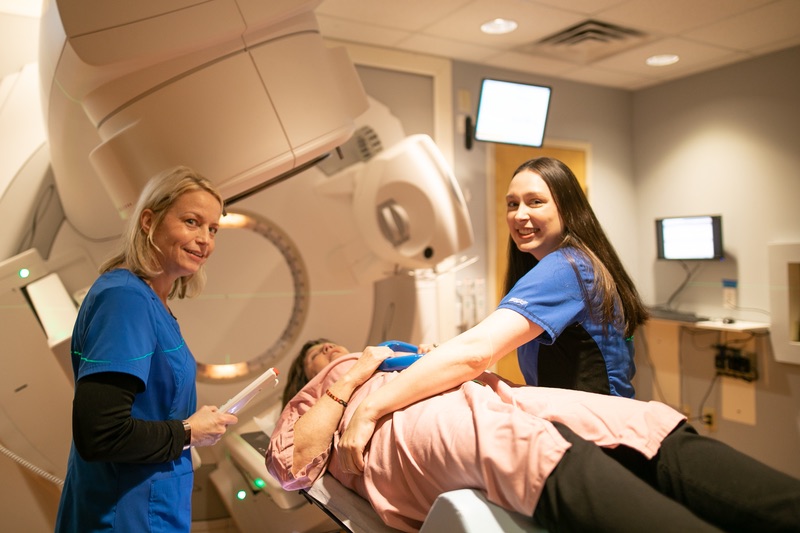
Ovarian cancer is best treated by a gynecologic oncologist. He or she is trained in the various types of ovarian treatment options and is most often also the surgeon that removes the cancer.
Treatment options and recommendations depend on several factors, including the type, stage, and grade of the cancer, possible side effects, and the patient’s preferences, overall health, and personal goals, such as whether they plan to have children. It’s important to discuss all your treatment options with your oncology team to help make the best decision for your personal needs.
The primary treatments for ovarian cancer are surgery, chemotherapy, and/or targeted therapy. However, other treatments may be used in certain situations. Also, since ovarian cancer treatment can affect cancer cells in the pelvis, in the abdomen, or throughout the body, a combination of more than one treatment may be recommended -- either at the same time or one after the other depending on where the cancer is located.
One option to remove the ovarian cancer is a traditional open surgery, called a laparotomy. During this surgery, the surgeon will want to remove as much of the cancer as possible by performing a procedure known as “debulking.” For many patients this requires the removal of the ovaries and uterus called a hysterectomy, as well as removal of the ovaries and fallopian tubes called a salpingo-oophorectomy.
Another option for many patients is to have the cancer removed laparoscopically. Laparoscopic surgeries eliminate large abdominal incisions and are therefore minimally invasive, providing less trauma to the body. Additionally, recovery is faster and hospital stays are shorter. This type of surgery can now be performed with a thin, lighted tube called a laparoscope, or with the da Vinci® robotic system, which makes minimally invasive surgery available to more women.
During ovarian cancer surgery, the surgeon may also need to:
Look for other tumors that may be in or near the abdomen that can be seen and removed
Take a biopsy of the abdominal tissue to test for cancer cells
Collect abdominal and lymph node fluids for testing to see if the cancer has spread
If you have early Stage I ovarian cancer, the extent of surgery may depend on whether you want to get pregnant and have children. Some women with very early ovarian cancer may decide with their doctor to have only one ovary, one fallopian tube, and the omentum (abdominal lining) removed.
Radiation therapy is the use of high-energy x-rays or other particles to destroy cancer cells. The most common type of radiation treatment is called external-beam radiation therapy, which is administered from a machine outside the body.
Although it is rarely used in the initial treatment of ovarian cancer, it may be used to treat early-stage tumors after chemotherapy. It may sometimes also be used as an option for treating small, localized recurrent cancer or to relieve pain and other problems caused by the disease.
Any patients receiving radiation will have a customized treatment plan created for them by the team using the latest in radiation therapy technologies available in the Atlanta area.

Chemotherapy drugs kill cancer cells throughout the body. Most women have chemotherapy for ovarian cancer after surgery. Some are also given chemotherapy before surgery to reduce the size of the tumor first.
Usually, more than one anticancer drug is given. Drugs for ovarian cancer can be given in different ways:
By vein (IV): The drugs can be given through a thin tube inserted into a vein.
Intraperitoneal (IP): Chemotherapy that is given directly into the abdomen.
Combination of vein and directly into the abdomen: Some women get IV chemotherapy combined with intraperitoneal (IP) chemotherapy.
By mouth: Some drugs for ovarian cancer can be given by mouth.
Chemotherapy is given in cycles. Each treatment period is followed by a rest period. The length of the rest period and the number of cycles depend on the anticancer drugs used.
You may have your treatment in a clinic, at the doctor’s office, or at home.
Immunotherapy, also called biologic therapy, is a treatment that uses the patient’s immune system to fight cancer. Substances made by the body or made in a laboratory are used to boost, direct, or restore the body’s natural defenses against cancer.
Pembrolizumab (Keytruda) and dostarlimab (Jemperli) are a type of immunotherapy called immune checkpoint inhibitors. They work by stopping the ability of cancer cells to stop the immune system from activating, which helps the immune system destroy cancer cells.
Pembrolizumab is approved by the FDA to treat metastatic ovarian cancers or cancers that cannot be removed with surgery and have specific genetic mutations.
Targeted therapy is a type of treatment that uses drugs or other substances to identify and attack specific cancer cells, resulting in less harm to normal, healthy cells. Cancer treatments that "target" cancer cells may offer the advantage of reduced treatment-related side effects and improved outcomes.
PARP inhibitors block an enzyme involved in repairing damaged DNA. By blocking this enzyme, DNA inside cancer cells may be less likely to be repaired, leading to cell death and possibly slowing down or stopping tumor growth. Olaparib, rucaparib, and niraparib are PARP inhibitors that may be used to treat advanced ovarian cancer. Rucaparib may also be used as maintenance therapy to treat ovarian epithelial cancer.
Anti-angiogenesis inhibitors are targeted therapy drugs that may prevent the growth of new blood vessels that tumors need to grow and may kill cancer cells. Bevacizumab (Avastin) is one such drug that has been shown to shrink or slow the growth of advanced epithelial ovarian cancers.
Hormone therapy, also called endocrine therapy, may be used to treat some low-grade serous tumors if they come back. Drugs that may be used include tamoxifen (Soltamox) and aromatase inhibitors, such as letrozole (Femara), anastrozole (Arimidex), and exemestane (Aromasin). Stromal tumors, such as recurrent granulosa cell tumors, can also be treated with hormone therapy.
Quickly and efficiently build the materials you need to support your inbound marketing strategy. Drag and drop building blocks including testimonials, forms, calls-to-action, and more.